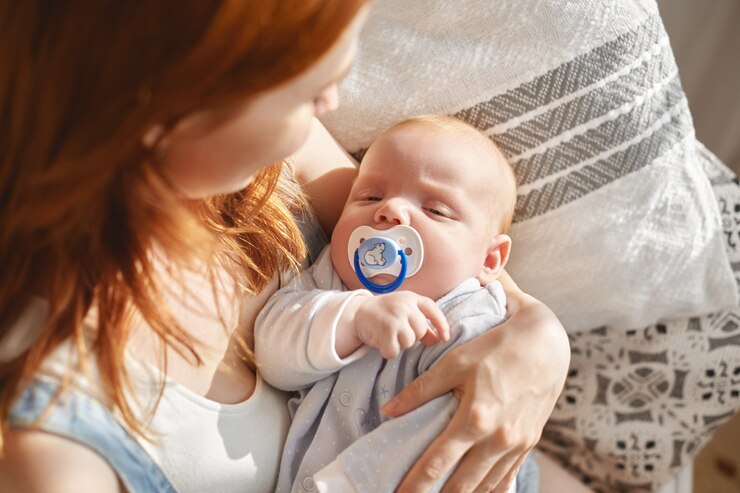- Details
- Category: Pregnancy & Birth
How to wash after childbirth? Tips for intimate hygiene
When washing your private parts, especially in the first few days after childbirth, use a suitable, very mild soap, and do not rub them to dry, but rather dab them with a delicate towel or a very soft, disposable paper towel, or if you prefer you can use a hair dryer with a gentle jet.
It is important to get rid of moisture residue, so we suggest you change the absorbent towel often and use cotton ones, to avoid irritation as much as
- Details
- Category: Pregnancy & Birth
 When to give dummies to infants?
When to give dummies to infants?
The choice of when to use the dummy is up to the parents. However, in the case of breastfeeding, it is advisable to give the dummy no sooner than 15 days after birth, and better still after the first month, so as not to disorient the baby and prevent it from latching on to the breast with more difficulty: after this period, the use of the dummy does not compromise breastfeeding in any way.
How much to use it? How often?
The dummy can be an ally in facilitating
- Details
- Category: Pregnancy & Birth
Labour is the set of phenomena that lead to the birth of your baby and the expulsion of the placenta. Every labour and birth follow their own course and there is no general rule for all women.
The duration is also very variable and depends from woman to woman.
Labour occurs when the hypothalamus of the foetus, ‘in dialogue’ with the mother's body, sends signals of its maturity to the placenta and, through hormonal stimuli travelling in the amniotic fluid, induces maternal hormone
- Details
- Category: Pregnancy & Birth
Below are some indications about the quantities of certain foods, which should be presented to children at age 6/9 months. These are quantities to be considered spread over the entire day:
- cow's milk: 300 cc
- bread: 100 g
- pasta or rice: 70 g
- parmesan cheese: 10 g
- extra virgin olive oil: 30 g
- fruit: 400 g
- vegetables: 200 g
- jam or honey: 30 g
- sugar: 5 g
Now the directions about the frequency of consumption of certain foods, to be spread over 14 meals per week (alternating between
- Time: what to do with your newborn
- Pregnancy: the heat in the summer
- How to be a Modern Samurai
- Pregnancy: contractions
- Water birth
- Pregnancy: the role of the father-to-be
- Childbirth: what are the pains of childbirth?
- Pregnancy: what to avoid
- Childbirth: contractions during labour
- Fetal Development
- The first milk: colostrum
- Childbirth: postpartum depression
- The Danish Way of Parenting: What the Happiest People in the World Know about Raising Confident
- Your Competent Child: Toward New Basic Values for the Family
- Pregnancy: month after month
- SIDS - Crib Death Syndrome
- What can dad or birth partner do during labor?
- Pregnancy: how the mother's body changes
- Pregnancy: mother's diet
- Pregnancy: introduction
- Childbirth: where to give birth?
- Pregnancy: preparatory courses
- Childbirth: some information


